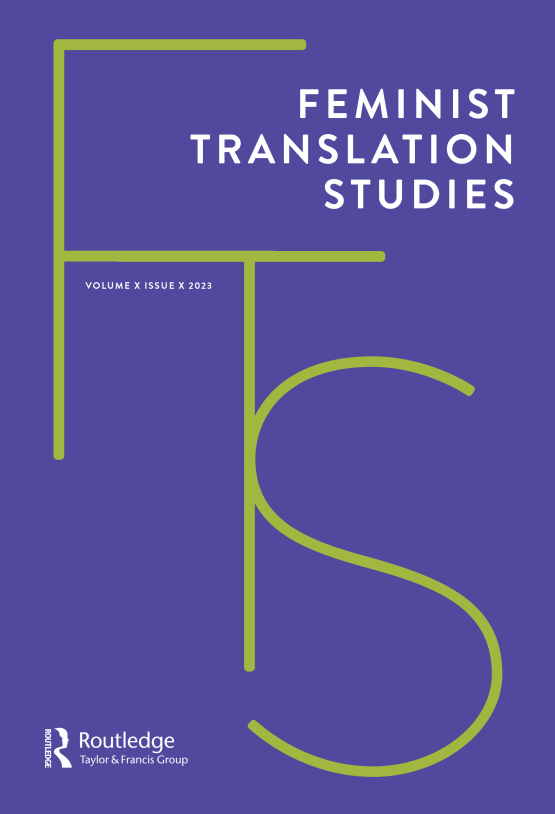Submit a Manuscript to the Journal
Feminist Translation Studies
For a Special Issue on
Translating as Feminists: Collectives and Collaborative Work
Abstract deadline
Manuscript deadline

Special Issue Editor(s)
Eleonora Federici,
University of Ferrara
eleonora.federici@unife.it
Pascale Sardin,
Bordeaux Montaigne University
pascale.sardin@u-bordeaux-montaigne.fr
Translating as Feminists: Collectives and Collaborative Work
Collectives of women that bring together activists, artists or thinkers have been instrumental in feminist movements and in the promotion of feminist ideas and practices. These groups, often based on a non-hierarchical organization and championing the idea of sorority, have functioned as sites of innovation, creativity and emancipation (Anadón et al. 1990). Over the decades, the organizing forces of feminist networks have further been enhanced by the development of the Internet. In the meantime, both collaborative translation processes (Alfer and Zwischenberger 2020) and feminist translation and translator studies have attracted increased attention (Vassallo 2023).
This Special Issue of Feminist Translation Studies proposes to explore the intersection of translation studies with feminist collectives involving collaborative practices and theories. We want to investigate the work of groups of translators and activists that seek to translate as feminists. Who are these groups of people that get together and use networking to translate in a feminist light? How do they work together? What methodological issues are raised by such practices and what ethical questions are posed by work, often done on a voluntary basis? How do collectives stand in relation to the ethics of volunteerism? Which kinds of texts are translated? How are translation theories rethought through such collective collaborative practices? Do these renewed theories and practices widen the scope of activism? How do these groups of translators use, help to think and produce inclusive language?
Collective and collaborative feminist translation enterprises thrive on the Internet, giving an idea of the variety of situations, means and texts involved. For example, TRADFEM (https://tradfem.wordpress.com/), created in France in 2013, aims to collectively translate texts inspired by the works of Andrea Dworkin, and has begun collaborating with publishing houses in a number of European countries and Canada. Other groups unite their forces to translate isolated texts, like the “Pussyteam”, a group of six professional female translators that collaborated to put into French The Pussypedia by Maria Conejo and Zoé Mendelson (https://www.editionsdalva.fr/traducteur%C2%B7rice/pussyteam). In Italy, translators’ collectives such as WIT, born around the feminist bookstore in Bologna, have translated Audre Lorde’s poems, widening the discussion of feminist issues beyond academia. Furthermore, transfeminist and transanimal collectives have among their aims the translation of feminist works and ideas: see for example, the Craazi centro di ricerca autonomo transfemministaqueer (http://www.craaazi.org/2018/04/29/traduzioni/) and Les Bitches (https://lesbitches.wordpress.com/info/). Another example, from Brazil, is Colectivo Sycorax, (https://coletivosycorax.org/), who seeks to disseminate works that challenge the capitalist logic of intellectual property by making the books translated available for free. In Argentina, the women forming Proyecto Medusa (@proyectomedusa) translate poetry so as to revise the canon.
Our aim in this Special Issue is thus to widen the scope of investigation to other contexts and languages, as well as to create a transnational dialogue among feminist translators, scholars and activists who translate collectively and/or collaborate all over the world with a feminist aim.
Submissions on all related topics are welcome, with articles on the following themes particularly encouraged:
- The history of collective and collaborative feminist translation.
- The practice and theory of collective and collaborative feminist translation.
- Decision-making in collective and collaborative feminist translating processes.
- Empowering and emancipation through collective and collaborative feminist translation.
- Ethics and politics of collective and collaborative feminist translation.
- Feminist translation strategies in collective and collaborative translating processes.
- Collective and collaborative feminist translation as a powerful tool for producing social, political and cultural transformation.
- Collective and collaborative feminist translation as a form of activism and as an agent of social, political and cultural change.
Submission Instructions
Abstracts of up to 500 words (excluding references) outlining the scope and main arguments of your proposed paper should be sent to the guest editors at eleonora.federici@unife.it and pascale.sardin@u-bordeaux-montaigne.fr by 30 October 2025. The proposal should include your name, affiliation, title, abstract, key words, references and a brief bio (100-150 words).
Decisions on accepted abstracts will be announced by 30 November 2025. Selected contributors will be invited to submit full research articles for peer-review by 30 June 2026.
Full articles up to 7,000 words in length (including abstract, endnotes and references) should be submitted via the journal submissions platform. Please select “Special Issue (and title)” when submitting. For more information, please see the journal submission guidelines or email the journal at FeministTranslationStudies@gmail.com
Expected publication date: June 2027.

